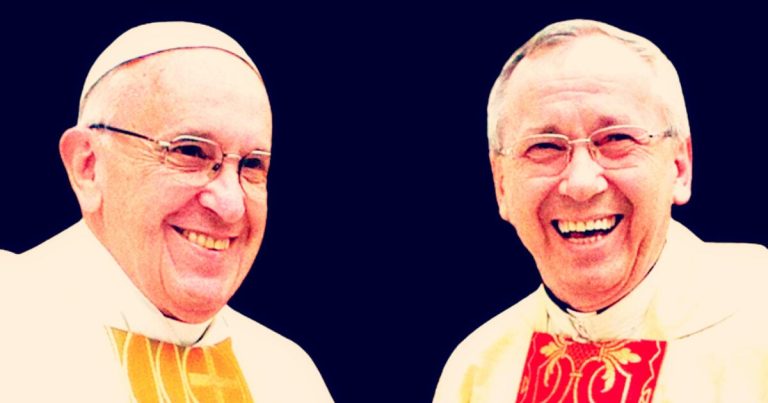
After Pope Francis's Global Dicastery for the Doctrine of the Faith (also known as the Holy Office) selected an Argentine colleague who has written several inappropriate and even sensational books, and was accused of covering up allegations of sexual abuse in his diocese, we are all bracing for the worst.
This came in the case of the famous Jesuit artist Marco Rubnik, who is only now being investigated for multiple accusations against him, after pressure from various sectors of the church became stronger than the protection that Francis and his Jesuit followers were offering him.
Read more:
Archbishop Vigano calls on the Swiss Guard to arrest Pope Francis and the cardinal responsible for a pornographic book
Gloria Branciani, one of the first women to accuse Rupnik of spiritual, psychological and sexual abuse, has come into public view again.
She appeared at a press conference with one of the most prominent lawyers accredited to the Vatican in Rome, Laura Sgro.
Branciani told her story publicly for the first time, detailing Rupnik's alleged abuses, including his penchant for threesomes “in the image of the Trinity,” a dangerous perversion of Catholic doctrine known as “pseudo-mysticism.”
The Associated Press reported:
“Rupnik has not commented publicly on the allegations, but his art studio in Rome has said the allegations are unproven, and media reports have called the case a defamatory ‘lynching’.”
Rupnik mosaics adorn churches and chapels around the world, including the Catholic shrine in Lourdes, France, the prospective cathedral in Aparecida, Brazil, and the Church of the Mother of the Redeemer in the Apostolic Palace.
The Jesuits expelled him from the order last year after he refused to respond to allegations of spiritual, psychological and sexual abuse by about 20 women, most of whom, like Branciani, were members of a Jesuit-inspired religious community he co-founded in 2011. His native Slovenia has since been repressed .

Branciani first denounced Rubinek in 1993. She believed that the pope was still ignorant of the details, and that even he would benefit from the truth.
“He (Rupnik) was always protected by everyone, and everything you could accuse him of was downplayed or denied,” she said. He added: “We hope that our testimony will stimulate greater transparency and awareness among everyone, and perhaps also the Pope, who was not really aware of the facts that happened.”
The Vatican Council deals with crimes of sexual abuse of minors as well as holy crimes. In the 1950s, a French Dominican priest, the Rev. Thomas Philippe, was sanctioned for false mysticism and other crimes after he distorted Catholic spirituality, religious art, and sex to justify his abuse of women by claiming that Jesus and Mary were engaged in sexual incest. relations.”
The Guardian reported:
“We were all young girls and full of ideals,” Kovac said during a press conference in Rome. “But these same ideals, along with our training in obedience, have been exploited to commit various abuses: conscience, authority, spiritual, psychological, physical, and often sexual.”
Both women reported Rubinek to senior Catholic Church officials in the early 1990s, but were rebuffed and dismissed.
“Rubinek was excommunicated in 2020 for disavowing a woman he had sex with; Exculpation of a “sexual partner” is among the most serious crimes under canon law. But he was restored to his position two weeks later after his repentance.
In 2022, the Department for the Doctrine of the Faith (DDF) dismissed the allegations against Rubinek brought by nine women, citing a statutory statute of limitations.
Later that year, after it was reported in the press that Rupnik had been treated with “kid gloves” by the church, the Jesuits issued a public call for victims to come forward. Rubinek was finally expelled from the order in June 2023 after The “degree of credibility” of the accusations against him was found to be “extremely high.”
Vatican News reported:
“The Vatican’s Department for the Doctrine of the Faith (DDF) has contacted several institutions over the past months to obtain documents relating to Father Marko Rubinek, a Jesuit and former artist born in Slovenia.
The Holy See confirmed that the investigation had been “expanded.”
On October 27, Pope Francis assigned the Dicastery for the Doctrine of the Faith to examine the case, having decided to “waive the statute of limitations to allow the proceedings to proceed.”
The decision was made after the Pontifical Commission for the Protection of Minors sent, in September, to the Pope some reports it had received regarding “serious problems” in the handling of Rubinek’s case and “lack of closeness to the victims.”
Read more:
Archbishop Vigano calls on the Swiss Guard to arrest Pope Francis and the cardinal responsible for a pornographic book

